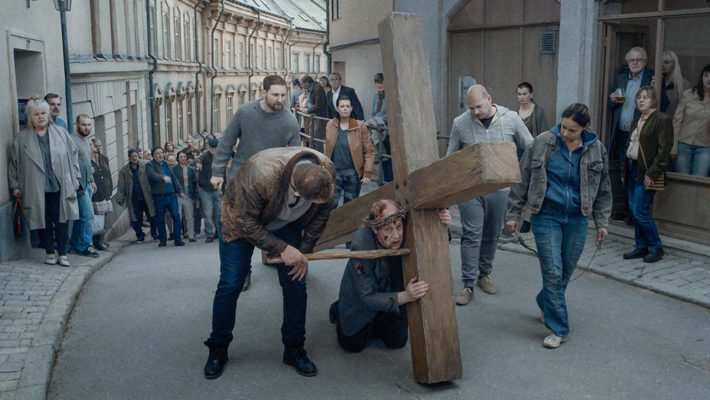No one makes films quite like Roy Andersson. The Swedish auteur creates tableaux of lost souls and broken hearts at his own studio, on specially-designed sound stages. He meticulously recreates everyday settings. We see people at the dentist, in their own kitchen, lounging on park benches, and in church. There are moments of quotidian banality, sudden outbursts, spontaneous dancing. It’s Andersson’s perfect simulacra of society, and it’s rather beautiful.
If you’ve never seen one of Andersson’s films before, you may find its structure baffling. If you have, then you’ll know pretty much what to expect. About Endlessness is a patchwork quilt of constructed of around 30 scenes, all shot at a middle distance on a static camera. A female voice often comments on the scene with the same neutral inflexion, whether for a man about to be executed or a sommelier over-filling a wine glass. “I saw a man begging for his life,” she says. “I saw a man with his mind on other things.”
With this approach, Andersson assigns an equal status to all human experience, viewing everything with the same wry irony. Some scenes are inherently comic, such as a dentist who walks out in irritation at his patient’s moans. Some are sad, such as a man with no legs busking in a subway. Presented as they are, they all achieve a cumulative significance. We see the acute melancholy of the man who has turned up to the wrong place for a date. We feel the intense love a man has for his young daughter as he walks through torrential rain for a friend’s birthday party. We witness the unfettered joy of three pretty girls who stop to dance to music outside a bar and are applauded by three appreciative sailors.
What is missing from About Endlessness is the occasional sense of righteous anger Andersson brought to earlier films like 2014’s A Pigeon Sat on a Branch Reflecting on Existence. There are no soldiers being led to off to be butchered in a phoney war, and there is nothing as horrific as black slaves herded into a burning container that makes music from their screams. Instead, there’s a consistent tone of wistfulness and a fatalistic melancholy. Even happier movements feel like they’ve been earned in defiance.
As in earlier films, there are a few characters who recur throughout. In About Endlessness it’s a priest who’s having a crisis of faith. His guilt manifests as a nightmare in which he enacts the Stations of the Cross while being whipped and beaten by various tormentors. At one point his psychiatrist forcibly removes the desperate clergymen from his office as he worries about missing his bus. It’s this absurdity that Andersson elevates to something approaching art.
To Andersson all human endeavour is equally foolish and equally deserving of celebration. For all its mordant, acutely Scandinavian outlook, About Endlessness is curiously life-affirming in a deadpan way. Andersson is playing a modern Erasmus and this is his In Praise of Folly. In all our mundanity, we achieve immortality. As one young man exclaims to a bored-looking young woman, quoting from the First Law of Thermodynamics, ‘It’s endless! We’re all energy! Energy can never seek to exist, it can only transform into something new!’ Quite.
As Part of Glasgow Film Festival 2020
